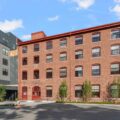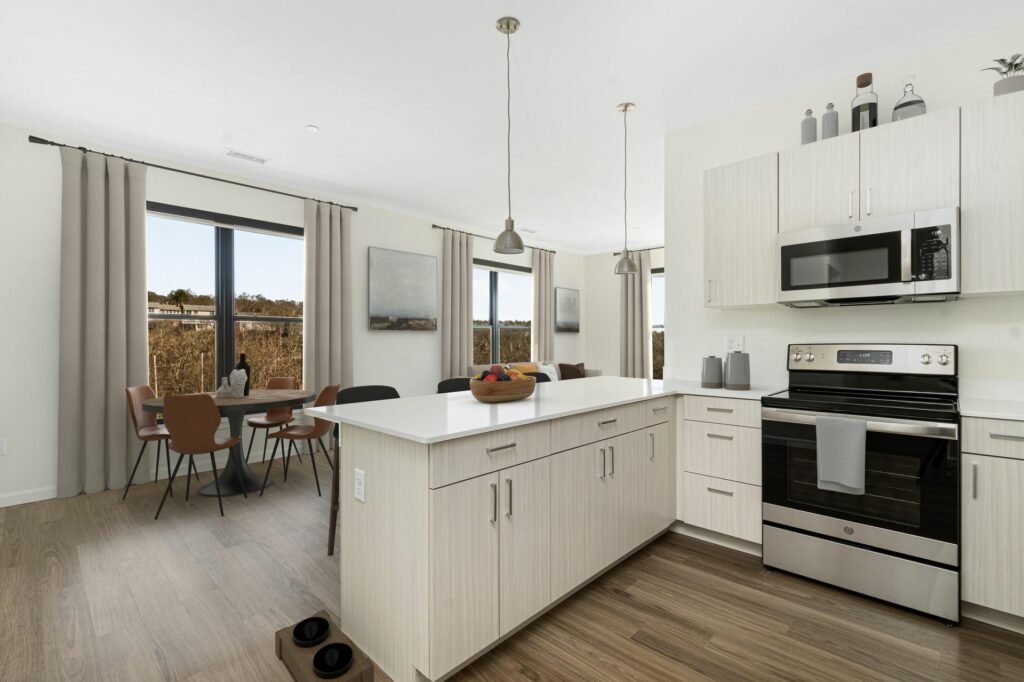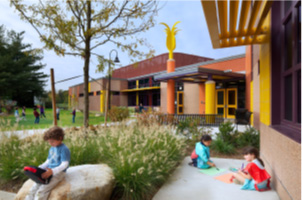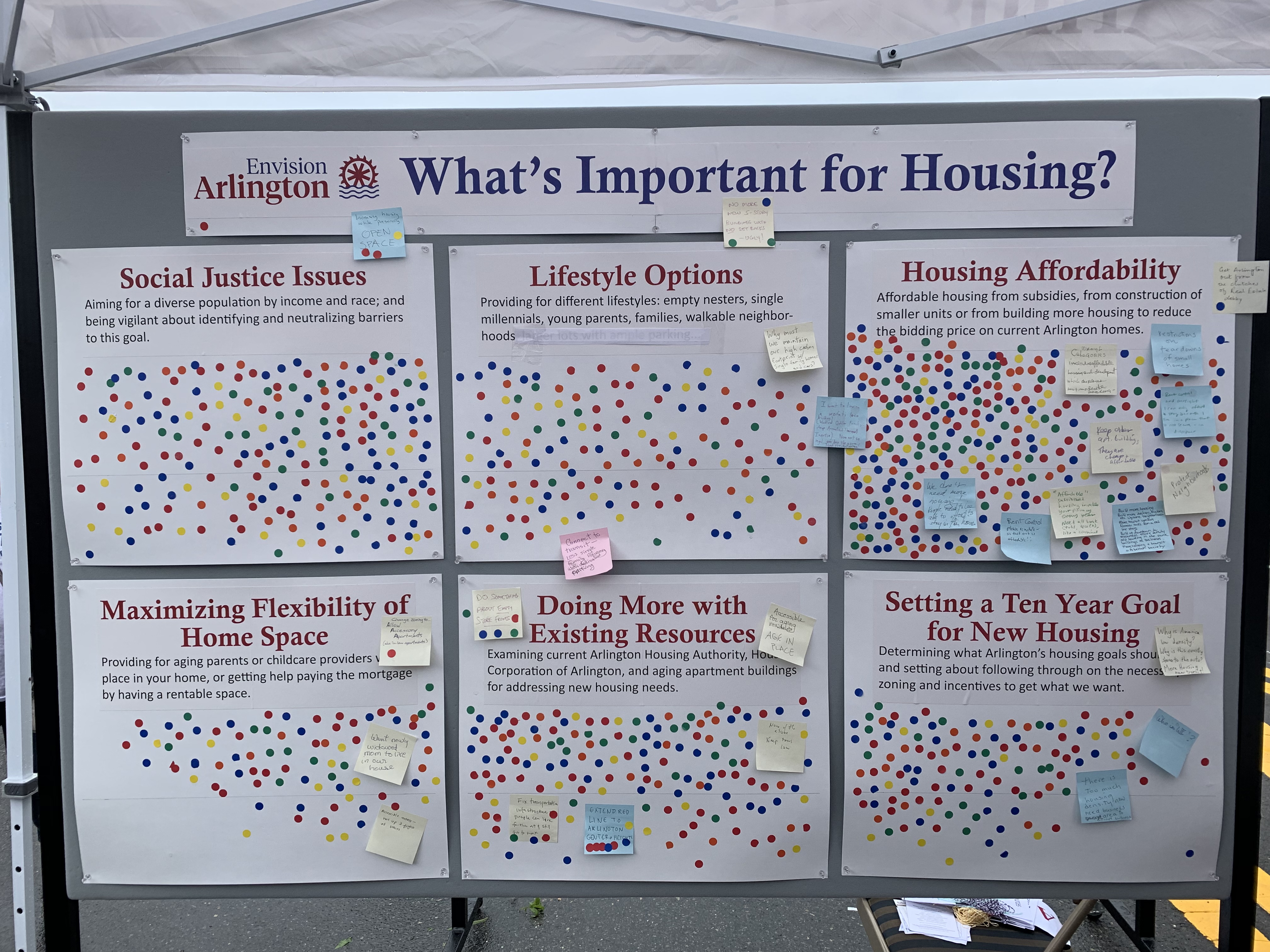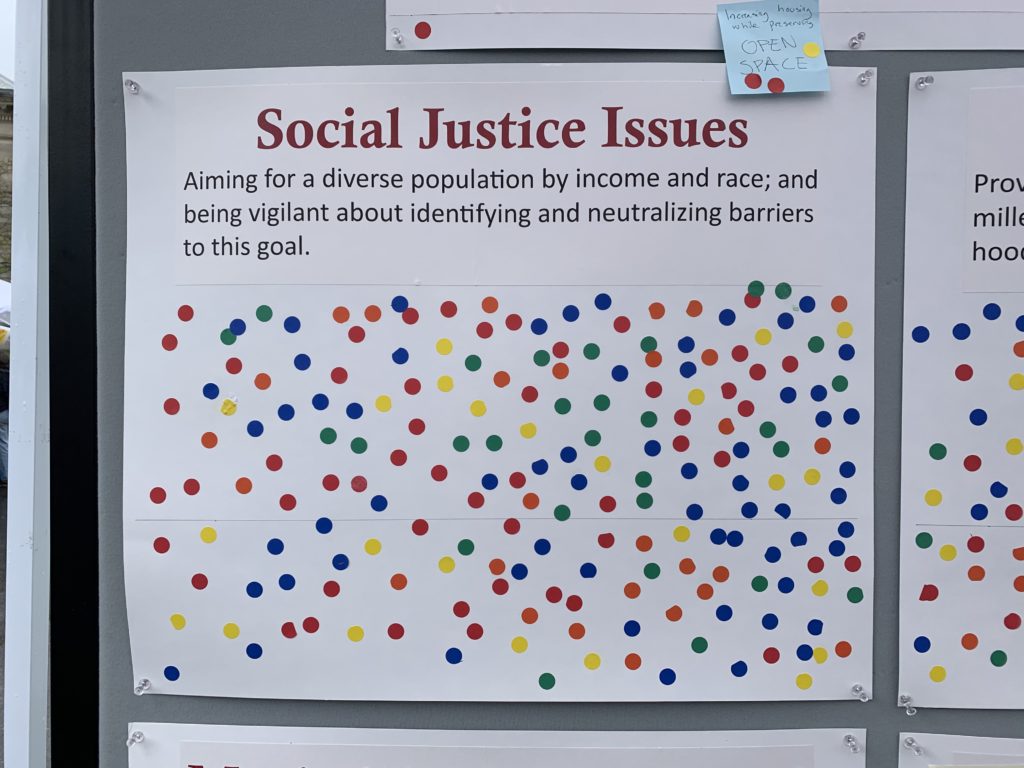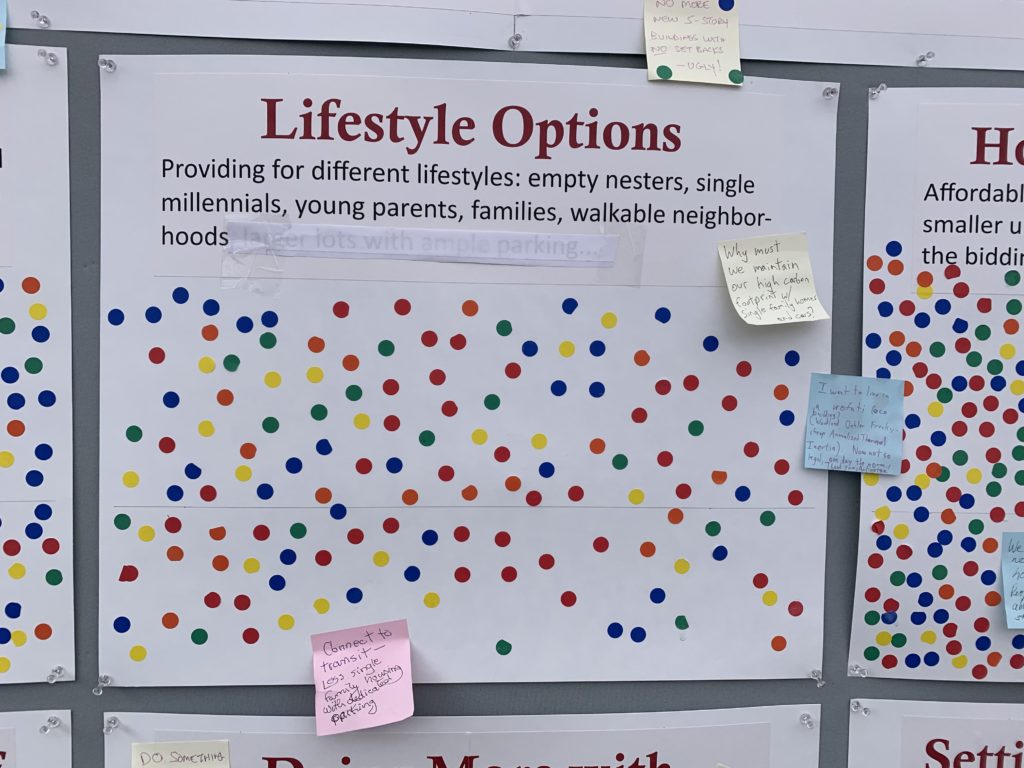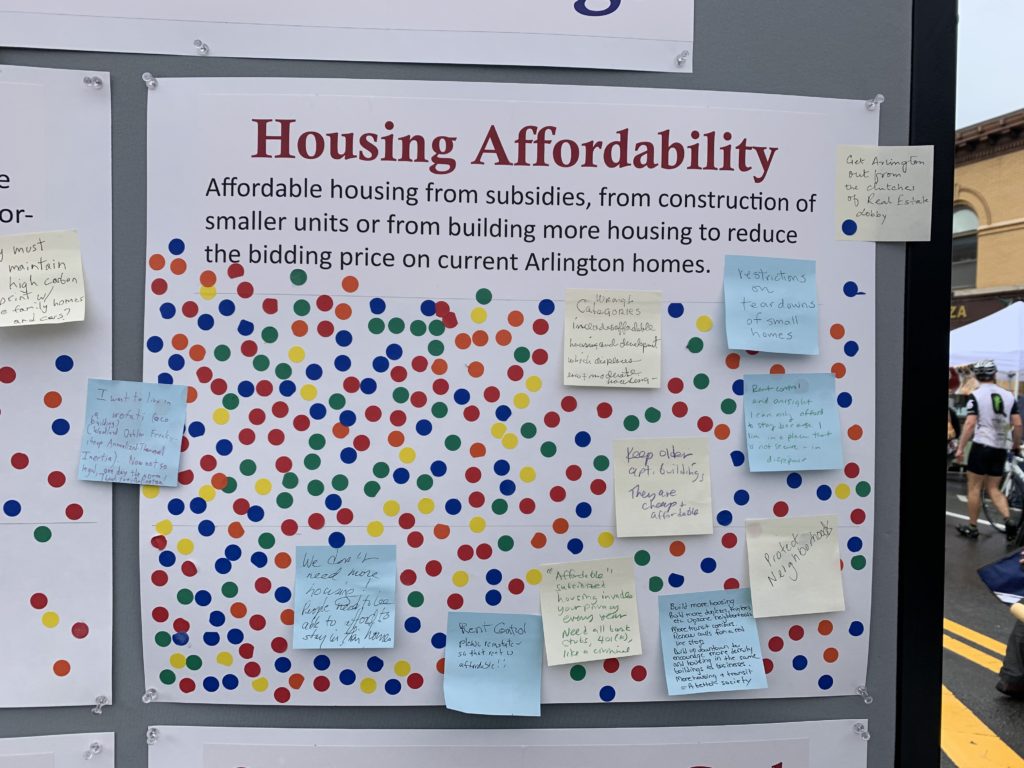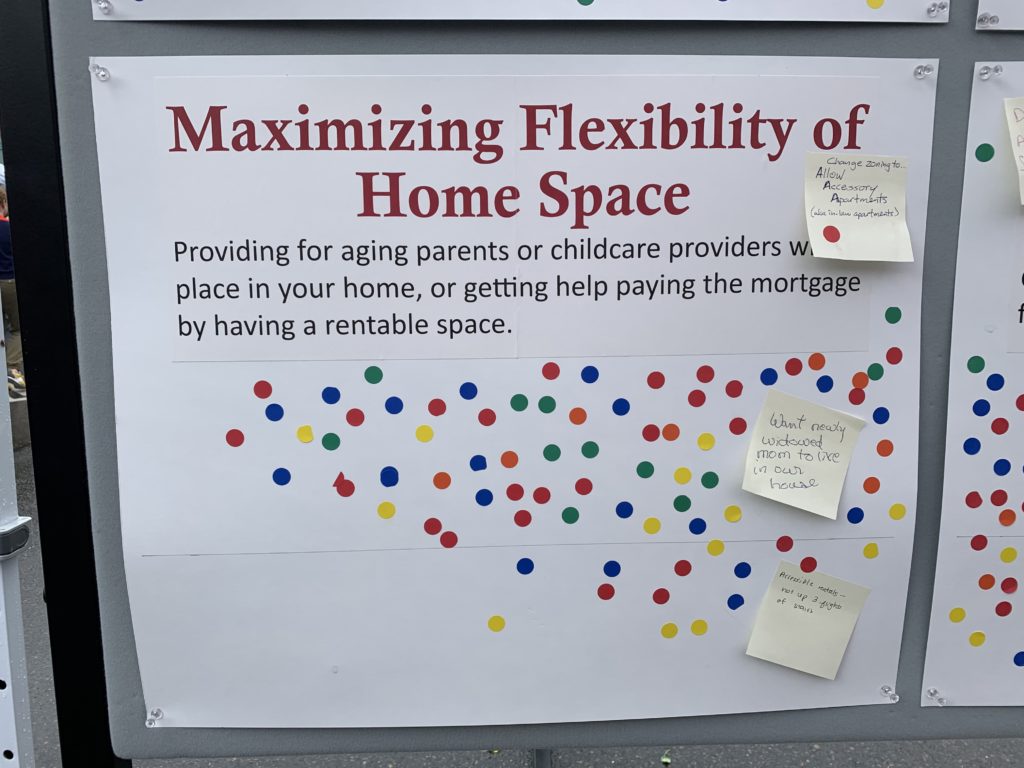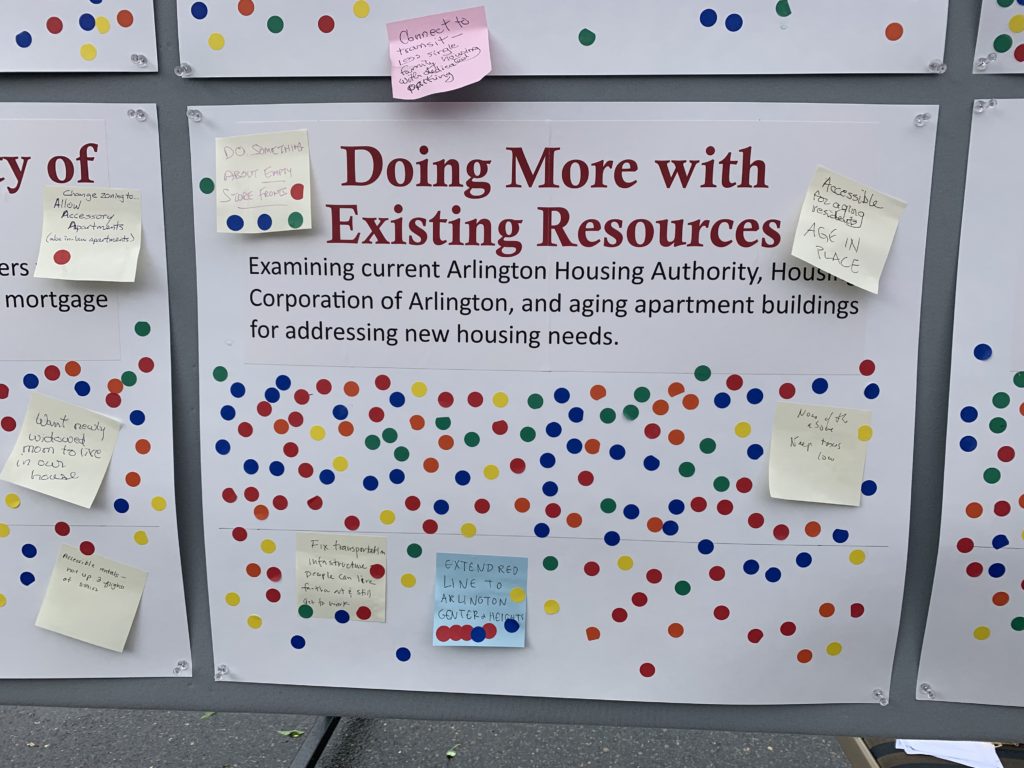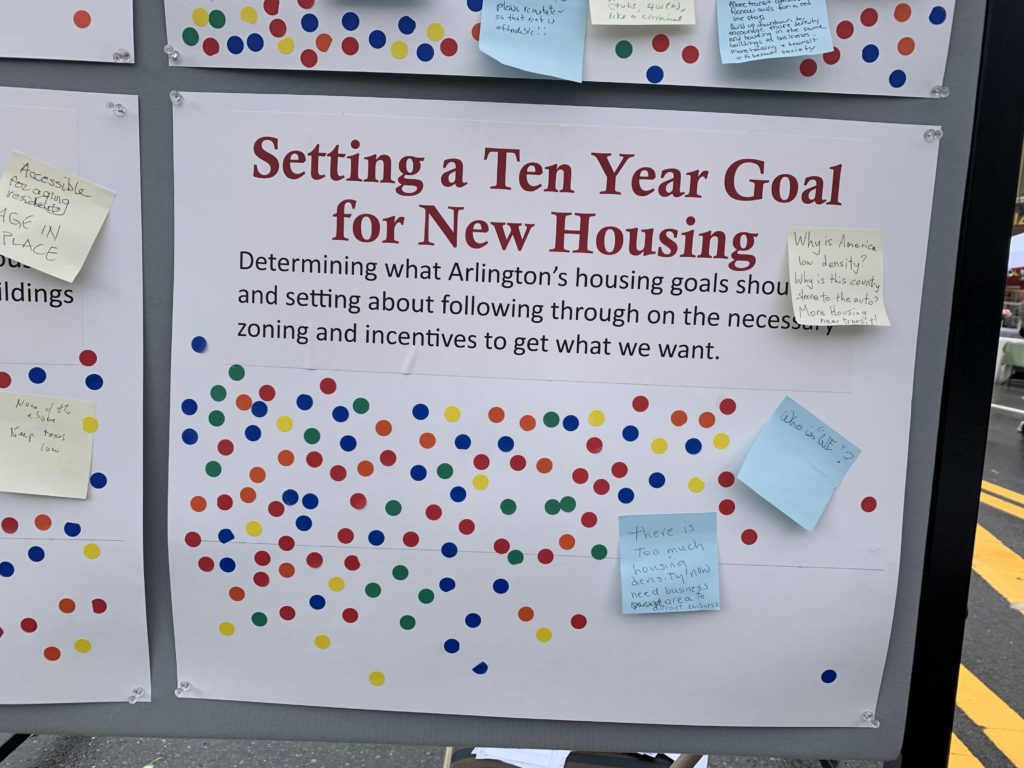Arlington is in the process of update the town’s 2016 Housing Production Plan, and the Housing Plan Implementation Committee and Planning Department have put together a “meeting in a box” as part of their outreach efforts. The idea is to package a set of discussion questions and supplementary materials, so that groups can talk through the questions on their own and provide written feedback. Meeting in a box materials are available from the town website.
I tried this with a group of friends. Here are the questions, and points that came up during the group discussion. Notes that these are discussion notes (transcribed from large sheets of easel paper), and don’t represent agreement or concensus.
Question 1: Housing Needs. Arlington residents have expressed concerns about the housing needs of older adults. Other needs identified so far are the cost and condition of rental housing, the impact of Arlington’s housing sale prices on the ability of young families to find a home in Arlington they can afford, and the impact of limited housing choices on racial and ethnic diversity in Arlington. What housing needs are you most concerned about?
- Address historical racial injustice and land use policies.
- Diversity and types of housing. Availability and affordability.
- Lack of diversity of housing types.
- Every house sold is a total bidding war.
- Better “stage of life housing” matches.
- Having an adequate range of options for lots of different needs.
- Impact on the regional housing shortage.
- Arlington is served by the T and buses; we have a responsibility to provide housing because we have access to transit.
- I was lucky to get in a few years ago, before prices started going crazy.
- We spend too much time romanticizing our old crumbling houses with lead paint.
- Arlington’s zoning encourages mansionization. As a result, we get one big expensive house rather than two smaller more affordable ones.
- What’s happening in Arlington today is the same thing that happened to Lexington 20 years ago — it became a community for affluent professionals only
- There’s too much emphasis on keeping things the way they were 20, 30, 40, or 50 years ago.
- Housing can be about preserving economic diversity, but we need a variety of housing types to do that.
- I’d be happy to see more people in town.
- Getting an affordable rental unit here is like winning the lottery.
- The suburbs have shut down housing production. That’s one of the things causing gentrification in Boston.
- Arlington’s housing mainly caters towards families with children. For our town’s financial health, we also need housing for families without children.
- With climate change, our practice of low-density, car-oriented, land-intensive sprawl is no longer sustainable. Density can be an important tool for addressing climate change, and we should use it to that effect.
Question 2: Challenges to Meeting Affordable Housing Needs. Participants in interviews conducted for the Housing Plan and at the June 9 Housing Plan Meeting were asked about challenges or obstacles to providing affordable housing in Arlington. Several challenges were identified, such as difficulty finding locations that for new housing development or redevelopment, how the Town’s Housing Trust Fund and CPA funds should be used to meet housing needs, and general tensions and disagreement about growth in Arlington that make it hard for people to agree. What challenges do you think are the biggest impediments to meeting housing needs in Arlington?
- There’s not a stable funding source for Arlington’s Affordable Housing Trust Fund.
- Housing is really expensive here.
- There are not enough affordable housing developers that are willing to navigate Arlington’s anti-development stance. They’ll build in other communities, where there’s less resistance.
- There’s a lack of political will to add affordable housing, or housing in general.
- There’s not enough land where multifamily housing can be built.
- There’s unreasonable resistance to new multi-family buildings, like apartments.
- The housing production plan identifies a number of opportunity zones. But they’re small, and there’s not enough land to create much of an opportunity.
- Our housing authority is not very aggressive about utilizing the land they have. Their leadership doesn’t seem to want to do it.
- The belief that “Arlington is full”. In reality, we’ve just chosen to be (by virtue of current zoning).
Question 3: Opportunities for Reaching Agreement. What steps would help to bring Arlington residents together about providing affordable housing? How can the Town balance concerns about housing needs and natural resources protection? Or concerns about housing need and preserving Arlington’s built environment? What do you think most could people agree on?
- Concern about exurban sprawl.
- Concern about gentrification.
- Our parking requirements make housing more expensive than it needs to be.
- We can agree on worries. I’m skeptical that we’ll be able to agree on solutions.
- There’s an unwillingness to accept incremental progress.
- Many incremental changes feel too big.
- If people feel threatened by affordable housing, they’ll oppose it.
- Shared values around the importance of having residents of a variety of economic situations.
- Do people really care about environmental sustainability when they move into a house? Not sure how you get people to sign on.
- There’s a conflict between anti-density and sustainability.
- If you don’t build here, there will be evergreen builds outside of 495.
- Teachers who teach here should be able to afford to live here.
- We need business growth and tax base growth.
- New housing should feel like it blends into the surrounding neighborhood.
- Our neighborhoods are changing. The fact that we’re not doing proactive things doesn’t prevent them from changing.
As you can see, our group had a range of opinions and even a few points of disagreement – for example, “there’s an unwillingness to accept incremental progress” vs “many incremental changes feel too big”. I feel like that pair is a good illustration of how different people have different comfort zones; a situation that can be challenging to navigate. Metro Boston is growing, as are metropolitan areas all across the country. Our new arrivals will need places to live, and I’d hope to see Arlington be proactive in addressing that need.
